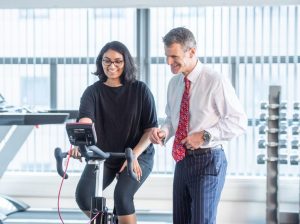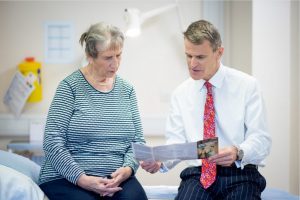 In England elective surgeries, such as hip and knee replacements, have been postponed to make bed space for patients requiring admission to hospital due to Covid-19. Head of ORI and Consultant Orthopaedic Surgeon, Professor Robert Middleton, has provided some advice for patients who have had their hip replacements postponed.
In England elective surgeries, such as hip and knee replacements, have been postponed to make bed space for patients requiring admission to hospital due to Covid-19. Head of ORI and Consultant Orthopaedic Surgeon, Professor Robert Middleton, has provided some advice for patients who have had their hip replacements postponed.
“The NHS has postponed many scheduled elective surgeries in order to create bed space for patients affected by Covid-19. Hence, hip and knee replacements are not available in the country at the moment. But for most patients with osteoarthritis, symptoms can be managed adequately at home, and they will be in a good place to have a hip replacement once the pandemic is over. The good news is that the two main things that you can do to manage your hip pain are possible to do at home. The first is keeping active, and the second is losing weight, if necessary.”
What types of physical activity would you recommend for someone awaiting a hip replacement?
“For osteoarthritis, is it best to focus on gentle, low impact exercise. The key thing is to gently stretch and strengthen the hip and supporting muscles. A lot of people are using Pilates or Yoga whilst at home. There are lots of helpful YouTube videos that you can use to guide gentle stretches and exercise classes. Functional exercises can also help to build strength. For example, the sit-to-stand movement, rising slowly from a chair and sitting back down again. If you can get outside, it is great to walk once a day, or to walk around your garden. The key thing is to use a walking aid if necessary, for example, a walking stick or Nordic walking poles. They reduce the load through your joint by around 60%, so often you can walk twice as far before getting pain, whilst also strengthening your muscles. An incentive called 10 today by Sport England provides 10 minute, low impact workouts for older adults, designed to improve physical activity and well-being. Peloton are also offering free exercise tutorials for 90 days.”
Are there any activities that should be avoided?
“Whilst keeping active, it is important to focus on low impact exercise, and remember to avoid activities that may make your arthritis worse. For example, running, jumping, heavy lifting, heavy manual work and twisting when using weights. These activities are likely to aggravate your hip arthritis.”
How often is exercise recommended? 
“It is important to do something regularly, perhaps twice a day, when you first get up in the morning, and then later on in the day. Many people feel stiffness in their hip early on in the morning, or after sitting for a long time. These symptoms indicate that the joint needs to be used. Try to do around 30 minutes of stretching exercise per day to help relieve symptoms of stiffness.”
What else can be done to help manage symptoms whilst at home?
“If you’re overweight, this is a great opportunity to lose some weight prior to surgery. To relieve pain, you could also try applying a hot or cold pad to your hip. You can use household items, such as a hot water bottle, or ice wrapped in a tea towel, to apply hot or cold therapy. If you need to take painkillers, paracetamol is often safest.“


